BMP6004: Organisational Learning's Impact on Company Performance
VerifiedAdded on 2023/06/12
|11
|2763
|291
Essay
AI Summary
This essay critically analyzes the role of organizational learning in enhancing company performance, drawing on theories like Kolb's Experiential Learning Theory and Senge's Adaptive and Generative Learning Theory. It discusses how organizational learning, as a business culture, fosters knowledge acquisition and skill development among employees through daily activities and decision-making. The essay highlights the importance of creating, retaining, and transferring knowledge within the organization to improve employee performance, retention, and customer satisfaction. It emphasizes the role of managers in promoting organizational learning by gathering market information, saving it in central databases, and effectively delivering it to staff members through training and communication. Ultimately, the essay concludes that organizational learning aligns company objectives with employee goals, fills skill gaps, and enhances the company's competitive position in the market.
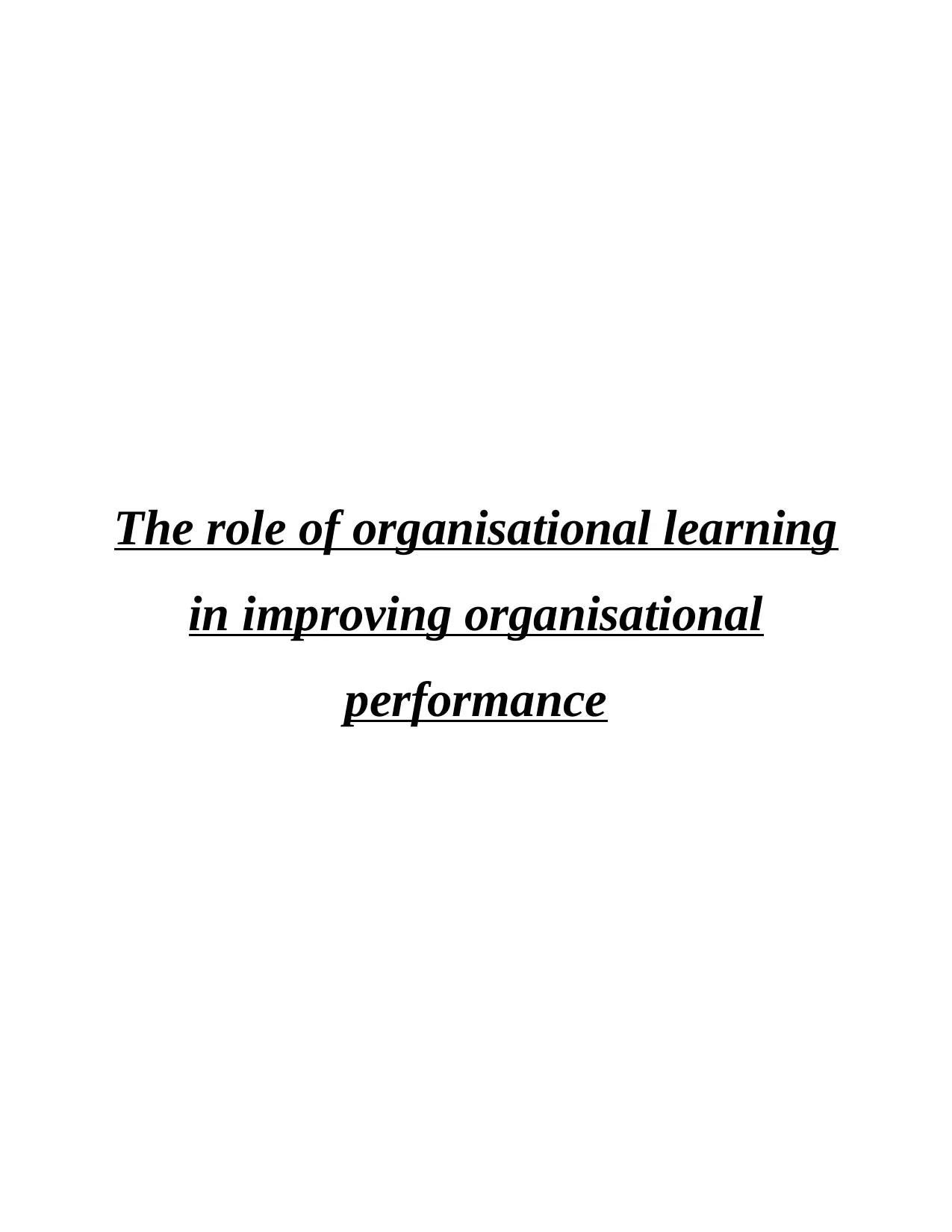
The role of organisational learning
in improving organisational
performance
in improving organisational
performance
Paraphrase This Document
Need a fresh take? Get an instant paraphrase of this document with our AI Paraphraser
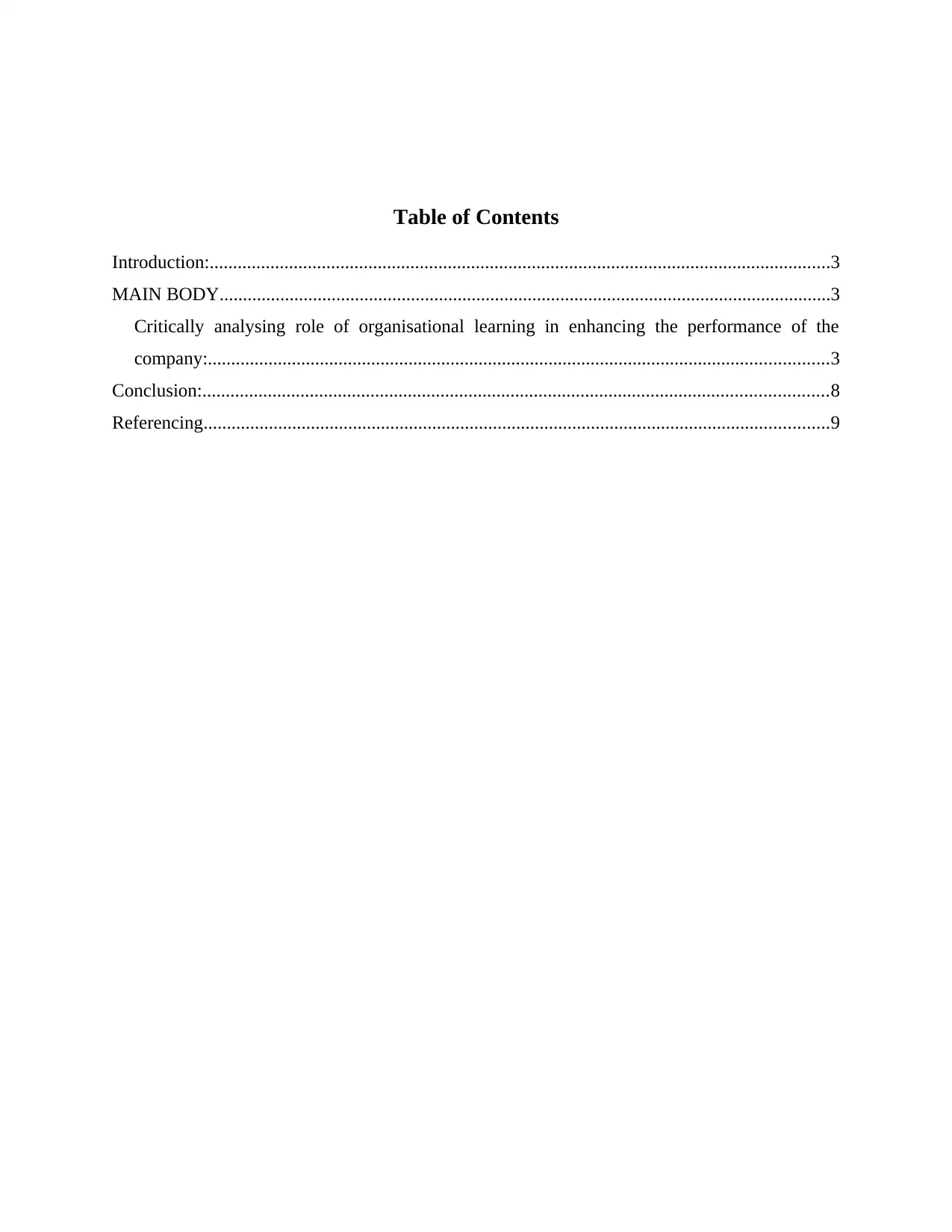
Table of Contents
Introduction:.....................................................................................................................................3
MAIN BODY...................................................................................................................................3
Critically analysing role of organisational learning in enhancing the performance of the
company:.....................................................................................................................................3
Conclusion:......................................................................................................................................8
Referencing......................................................................................................................................9
Introduction:.....................................................................................................................................3
MAIN BODY...................................................................................................................................3
Critically analysing role of organisational learning in enhancing the performance of the
company:.....................................................................................................................................3
Conclusion:......................................................................................................................................8
Referencing......................................................................................................................................9
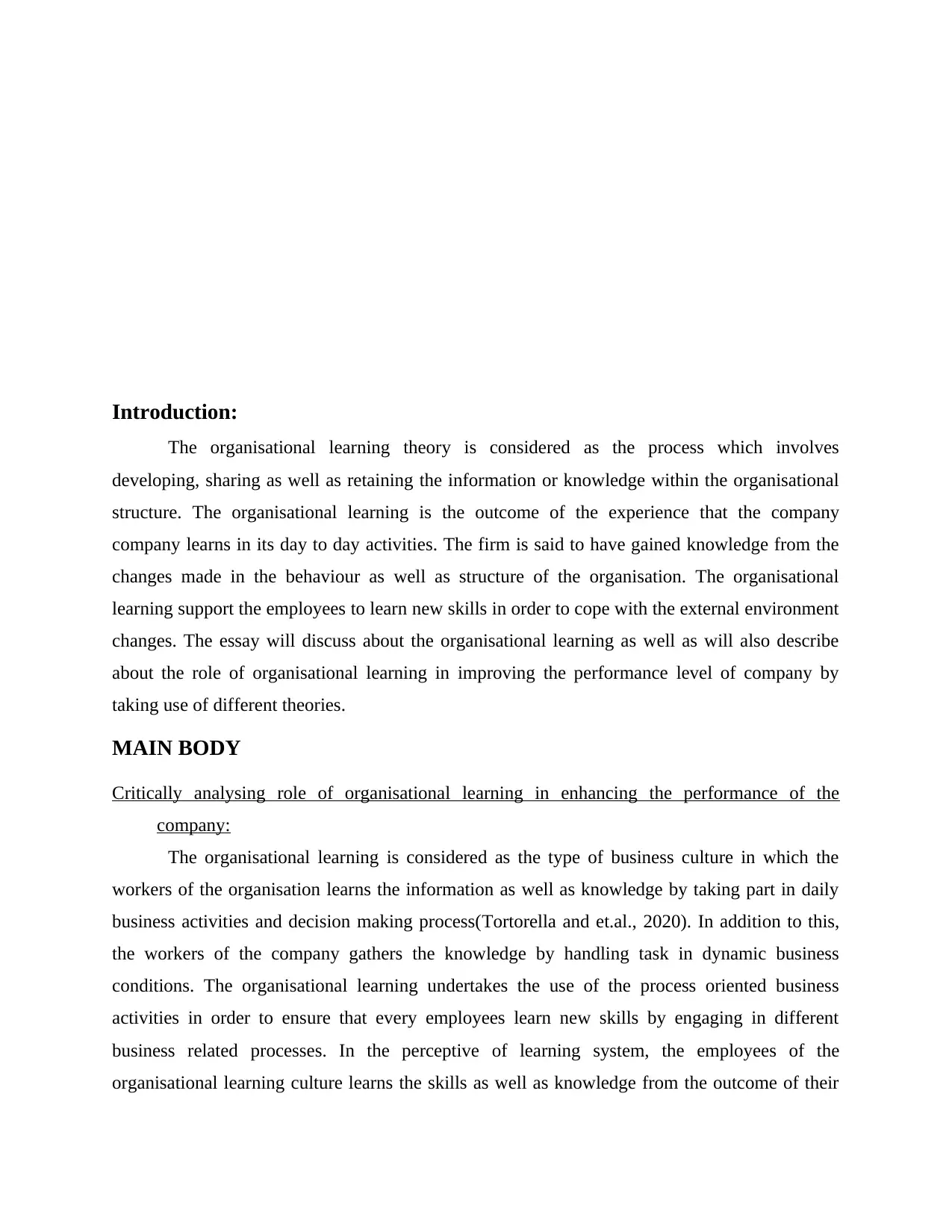
Introduction:
The organisational learning theory is considered as the process which involves
developing, sharing as well as retaining the information or knowledge within the organisational
structure. The organisational learning is the outcome of the experience that the company
company learns in its day to day activities. The firm is said to have gained knowledge from the
changes made in the behaviour as well as structure of the organisation. The organisational
learning support the employees to learn new skills in order to cope with the external environment
changes. The essay will discuss about the organisational learning as well as will also describe
about the role of organisational learning in improving the performance level of company by
taking use of different theories.
MAIN BODY
Critically analysing role of organisational learning in enhancing the performance of the
company:
The organisational learning is considered as the type of business culture in which the
workers of the organisation learns the information as well as knowledge by taking part in daily
business activities and decision making process(Tortorella and et.al., 2020). In addition to this,
the workers of the company gathers the knowledge by handling task in dynamic business
conditions. The organisational learning undertakes the use of the process oriented business
activities in order to ensure that every employees learn new skills by engaging in different
business related processes. In the perceptive of learning system, the employees of the
organisational learning culture learns the skills as well as knowledge from the outcome of their
The organisational learning theory is considered as the process which involves
developing, sharing as well as retaining the information or knowledge within the organisational
structure. The organisational learning is the outcome of the experience that the company
company learns in its day to day activities. The firm is said to have gained knowledge from the
changes made in the behaviour as well as structure of the organisation. The organisational
learning support the employees to learn new skills in order to cope with the external environment
changes. The essay will discuss about the organisational learning as well as will also describe
about the role of organisational learning in improving the performance level of company by
taking use of different theories.
MAIN BODY
Critically analysing role of organisational learning in enhancing the performance of the
company:
The organisational learning is considered as the type of business culture in which the
workers of the organisation learns the information as well as knowledge by taking part in daily
business activities and decision making process(Tortorella and et.al., 2020). In addition to this,
the workers of the company gathers the knowledge by handling task in dynamic business
conditions. The organisational learning undertakes the use of the process oriented business
activities in order to ensure that every employees learn new skills by engaging in different
business related processes. In the perceptive of learning system, the employees of the
organisational learning culture learns the skills as well as knowledge from the outcome of their
⊘ This is a preview!⊘
Do you want full access?
Subscribe today to unlock all pages.

Trusted by 1+ million students worldwide
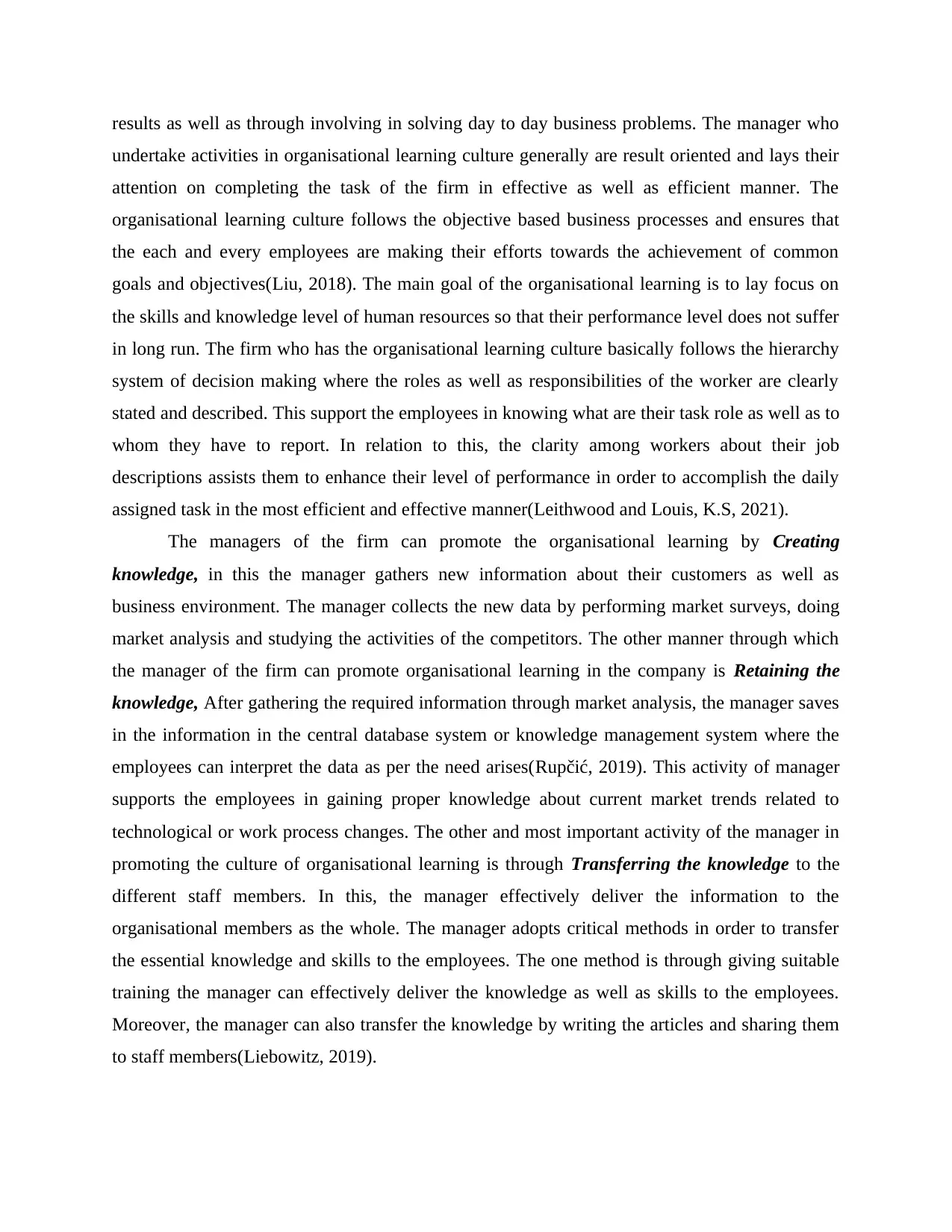
results as well as through involving in solving day to day business problems. The manager who
undertake activities in organisational learning culture generally are result oriented and lays their
attention on completing the task of the firm in effective as well as efficient manner. The
organisational learning culture follows the objective based business processes and ensures that
the each and every employees are making their efforts towards the achievement of common
goals and objectives(Liu, 2018). The main goal of the organisational learning is to lay focus on
the skills and knowledge level of human resources so that their performance level does not suffer
in long run. The firm who has the organisational learning culture basically follows the hierarchy
system of decision making where the roles as well as responsibilities of the worker are clearly
stated and described. This support the employees in knowing what are their task role as well as to
whom they have to report. In relation to this, the clarity among workers about their job
descriptions assists them to enhance their level of performance in order to accomplish the daily
assigned task in the most efficient and effective manner(Leithwood and Louis, K.S, 2021).
The managers of the firm can promote the organisational learning by Creating
knowledge, in this the manager gathers new information about their customers as well as
business environment. The manager collects the new data by performing market surveys, doing
market analysis and studying the activities of the competitors. The other manner through which
the manager of the firm can promote organisational learning in the company is Retaining the
knowledge, After gathering the required information through market analysis, the manager saves
in the information in the central database system or knowledge management system where the
employees can interpret the data as per the need arises(Rupčić, 2019). This activity of manager
supports the employees in gaining proper knowledge about current market trends related to
technological or work process changes. The other and most important activity of the manager in
promoting the culture of organisational learning is through Transferring the knowledge to the
different staff members. In this, the manager effectively deliver the information to the
organisational members as the whole. The manager adopts critical methods in order to transfer
the essential knowledge and skills to the employees. The one method is through giving suitable
training the manager can effectively deliver the knowledge as well as skills to the employees.
Moreover, the manager can also transfer the knowledge by writing the articles and sharing them
to staff members(Liebowitz, 2019).
undertake activities in organisational learning culture generally are result oriented and lays their
attention on completing the task of the firm in effective as well as efficient manner. The
organisational learning culture follows the objective based business processes and ensures that
the each and every employees are making their efforts towards the achievement of common
goals and objectives(Liu, 2018). The main goal of the organisational learning is to lay focus on
the skills and knowledge level of human resources so that their performance level does not suffer
in long run. The firm who has the organisational learning culture basically follows the hierarchy
system of decision making where the roles as well as responsibilities of the worker are clearly
stated and described. This support the employees in knowing what are their task role as well as to
whom they have to report. In relation to this, the clarity among workers about their job
descriptions assists them to enhance their level of performance in order to accomplish the daily
assigned task in the most efficient and effective manner(Leithwood and Louis, K.S, 2021).
The managers of the firm can promote the organisational learning by Creating
knowledge, in this the manager gathers new information about their customers as well as
business environment. The manager collects the new data by performing market surveys, doing
market analysis and studying the activities of the competitors. The other manner through which
the manager of the firm can promote organisational learning in the company is Retaining the
knowledge, After gathering the required information through market analysis, the manager saves
in the information in the central database system or knowledge management system where the
employees can interpret the data as per the need arises(Rupčić, 2019). This activity of manager
supports the employees in gaining proper knowledge about current market trends related to
technological or work process changes. The other and most important activity of the manager in
promoting the culture of organisational learning is through Transferring the knowledge to the
different staff members. In this, the manager effectively deliver the information to the
organisational members as the whole. The manager adopts critical methods in order to transfer
the essential knowledge and skills to the employees. The one method is through giving suitable
training the manager can effectively deliver the knowledge as well as skills to the employees.
Moreover, the manager can also transfer the knowledge by writing the articles and sharing them
to staff members(Liebowitz, 2019).
Paraphrase This Document
Need a fresh take? Get an instant paraphrase of this document with our AI Paraphraser
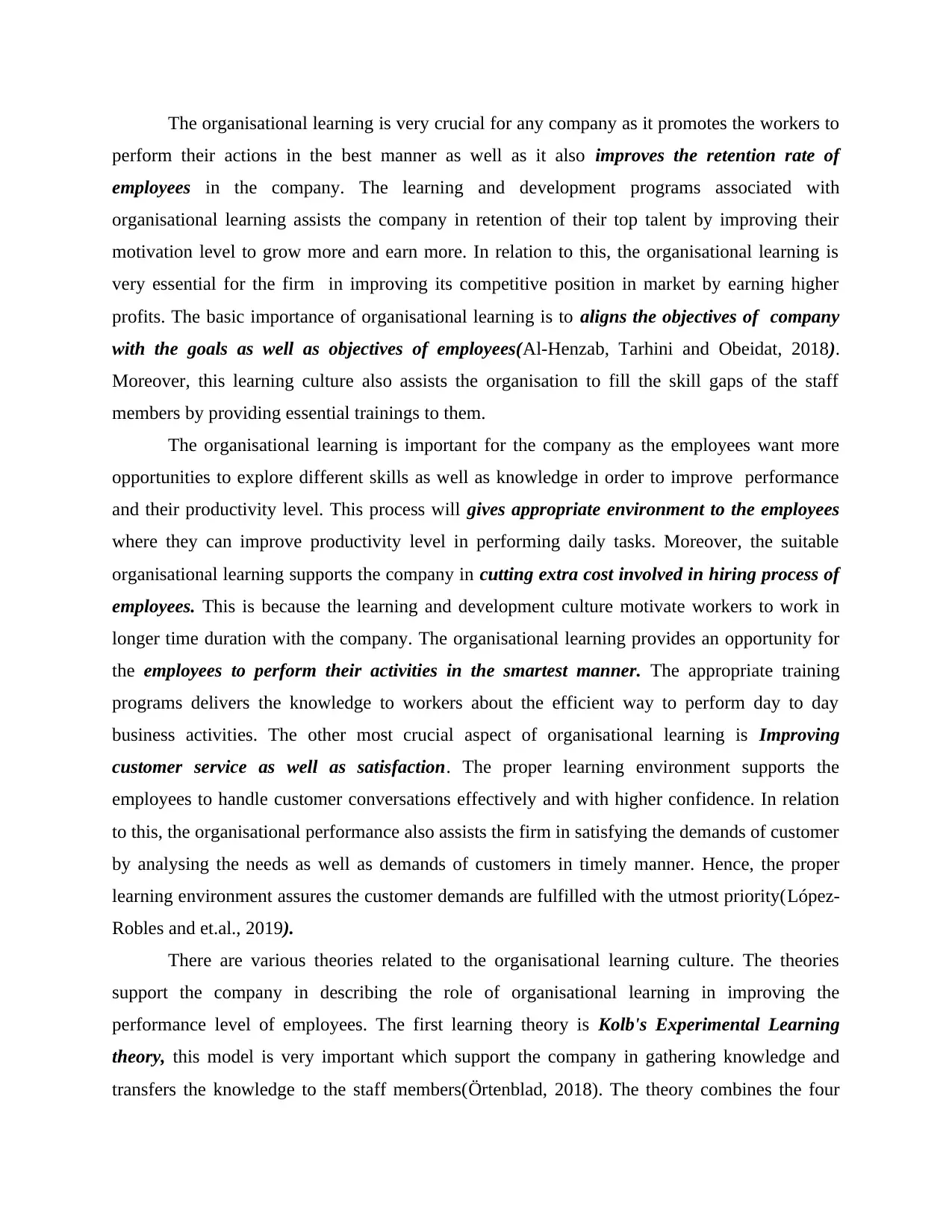
The organisational learning is very crucial for any company as it promotes the workers to
perform their actions in the best manner as well as it also improves the retention rate of
employees in the company. The learning and development programs associated with
organisational learning assists the company in retention of their top talent by improving their
motivation level to grow more and earn more. In relation to this, the organisational learning is
very essential for the firm in improving its competitive position in market by earning higher
profits. The basic importance of organisational learning is to aligns the objectives of company
with the goals as well as objectives of employees(Al-Henzab, Tarhini and Obeidat, 2018).
Moreover, this learning culture also assists the organisation to fill the skill gaps of the staff
members by providing essential trainings to them.
The organisational learning is important for the company as the employees want more
opportunities to explore different skills as well as knowledge in order to improve performance
and their productivity level. This process will gives appropriate environment to the employees
where they can improve productivity level in performing daily tasks. Moreover, the suitable
organisational learning supports the company in cutting extra cost involved in hiring process of
employees. This is because the learning and development culture motivate workers to work in
longer time duration with the company. The organisational learning provides an opportunity for
the employees to perform their activities in the smartest manner. The appropriate training
programs delivers the knowledge to workers about the efficient way to perform day to day
business activities. The other most crucial aspect of organisational learning is Improving
customer service as well as satisfaction. The proper learning environment supports the
employees to handle customer conversations effectively and with higher confidence. In relation
to this, the organisational performance also assists the firm in satisfying the demands of customer
by analysing the needs as well as demands of customers in timely manner. Hence, the proper
learning environment assures the customer demands are fulfilled with the utmost priority(López-
Robles and et.al., 2019).
There are various theories related to the organisational learning culture. The theories
support the company in describing the role of organisational learning in improving the
performance level of employees. The first learning theory is Kolb's Experimental Learning
theory, this model is very important which support the company in gathering knowledge and
transfers the knowledge to the staff members(Örtenblad, 2018). The theory combines the four
perform their actions in the best manner as well as it also improves the retention rate of
employees in the company. The learning and development programs associated with
organisational learning assists the company in retention of their top talent by improving their
motivation level to grow more and earn more. In relation to this, the organisational learning is
very essential for the firm in improving its competitive position in market by earning higher
profits. The basic importance of organisational learning is to aligns the objectives of company
with the goals as well as objectives of employees(Al-Henzab, Tarhini and Obeidat, 2018).
Moreover, this learning culture also assists the organisation to fill the skill gaps of the staff
members by providing essential trainings to them.
The organisational learning is important for the company as the employees want more
opportunities to explore different skills as well as knowledge in order to improve performance
and their productivity level. This process will gives appropriate environment to the employees
where they can improve productivity level in performing daily tasks. Moreover, the suitable
organisational learning supports the company in cutting extra cost involved in hiring process of
employees. This is because the learning and development culture motivate workers to work in
longer time duration with the company. The organisational learning provides an opportunity for
the employees to perform their activities in the smartest manner. The appropriate training
programs delivers the knowledge to workers about the efficient way to perform day to day
business activities. The other most crucial aspect of organisational learning is Improving
customer service as well as satisfaction. The proper learning environment supports the
employees to handle customer conversations effectively and with higher confidence. In relation
to this, the organisational performance also assists the firm in satisfying the demands of customer
by analysing the needs as well as demands of customers in timely manner. Hence, the proper
learning environment assures the customer demands are fulfilled with the utmost priority(López-
Robles and et.al., 2019).
There are various theories related to the organisational learning culture. The theories
support the company in describing the role of organisational learning in improving the
performance level of employees. The first learning theory is Kolb's Experimental Learning
theory, this model is very important which support the company in gathering knowledge and
transfers the knowledge to the staff members(Örtenblad, 2018). The theory combines the four
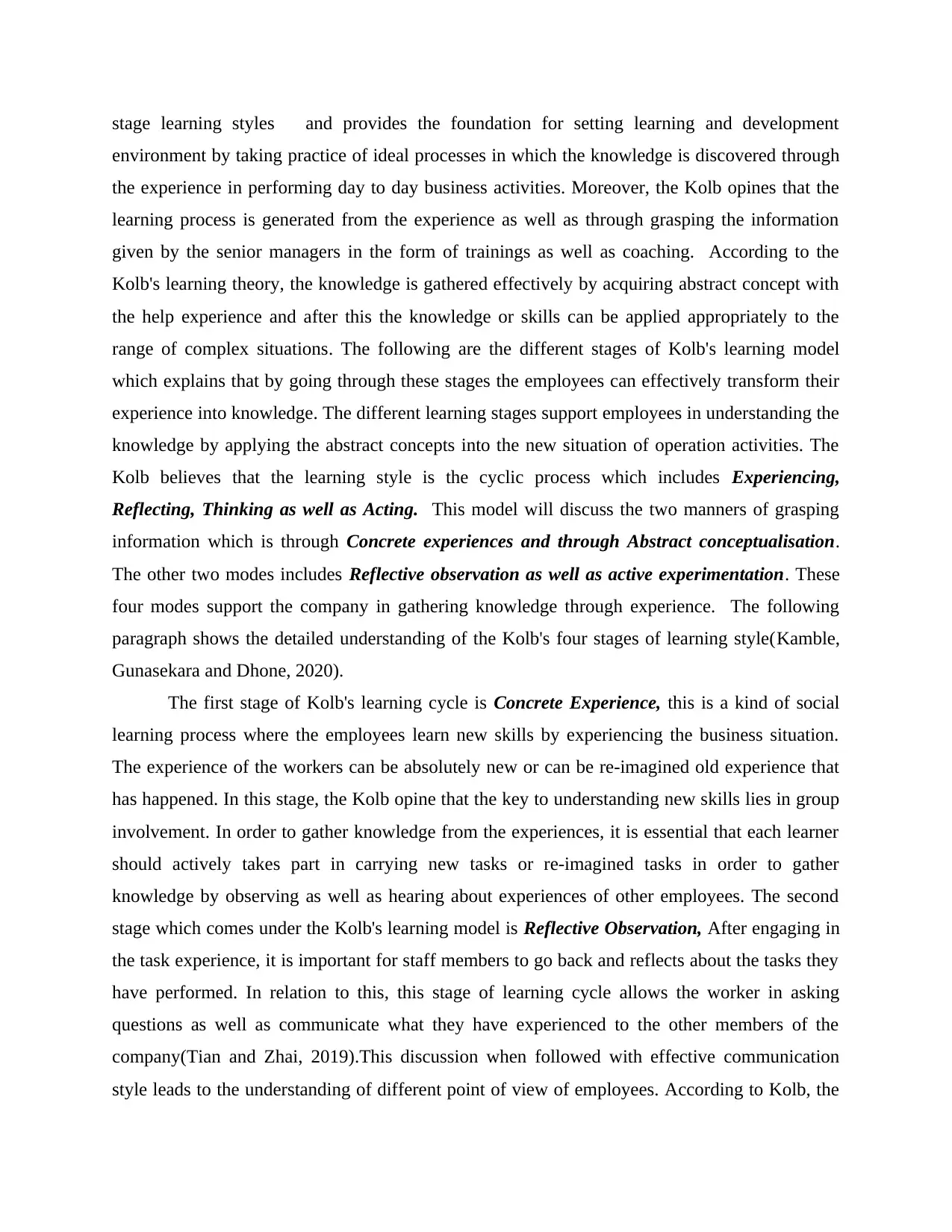
stage learning styles and provides the foundation for setting learning and development
environment by taking practice of ideal processes in which the knowledge is discovered through
the experience in performing day to day business activities. Moreover, the Kolb opines that the
learning process is generated from the experience as well as through grasping the information
given by the senior managers in the form of trainings as well as coaching. According to the
Kolb's learning theory, the knowledge is gathered effectively by acquiring abstract concept with
the help experience and after this the knowledge or skills can be applied appropriately to the
range of complex situations. The following are the different stages of Kolb's learning model
which explains that by going through these stages the employees can effectively transform their
experience into knowledge. The different learning stages support employees in understanding the
knowledge by applying the abstract concepts into the new situation of operation activities. The
Kolb believes that the learning style is the cyclic process which includes Experiencing,
Reflecting, Thinking as well as Acting. This model will discuss the two manners of grasping
information which is through Concrete experiences and through Abstract conceptualisation.
The other two modes includes Reflective observation as well as active experimentation. These
four modes support the company in gathering knowledge through experience. The following
paragraph shows the detailed understanding of the Kolb's four stages of learning style(Kamble,
Gunasekara and Dhone, 2020).
The first stage of Kolb's learning cycle is Concrete Experience, this is a kind of social
learning process where the employees learn new skills by experiencing the business situation.
The experience of the workers can be absolutely new or can be re-imagined old experience that
has happened. In this stage, the Kolb opine that the key to understanding new skills lies in group
involvement. In order to gather knowledge from the experiences, it is essential that each learner
should actively takes part in carrying new tasks or re-imagined tasks in order to gather
knowledge by observing as well as hearing about experiences of other employees. The second
stage which comes under the Kolb's learning model is Reflective Observation, After engaging in
the task experience, it is important for staff members to go back and reflects about the tasks they
have performed. In relation to this, this stage of learning cycle allows the worker in asking
questions as well as communicate what they have experienced to the other members of the
company(Tian and Zhai, 2019).This discussion when followed with effective communication
style leads to the understanding of different point of view of employees. According to Kolb, the
environment by taking practice of ideal processes in which the knowledge is discovered through
the experience in performing day to day business activities. Moreover, the Kolb opines that the
learning process is generated from the experience as well as through grasping the information
given by the senior managers in the form of trainings as well as coaching. According to the
Kolb's learning theory, the knowledge is gathered effectively by acquiring abstract concept with
the help experience and after this the knowledge or skills can be applied appropriately to the
range of complex situations. The following are the different stages of Kolb's learning model
which explains that by going through these stages the employees can effectively transform their
experience into knowledge. The different learning stages support employees in understanding the
knowledge by applying the abstract concepts into the new situation of operation activities. The
Kolb believes that the learning style is the cyclic process which includes Experiencing,
Reflecting, Thinking as well as Acting. This model will discuss the two manners of grasping
information which is through Concrete experiences and through Abstract conceptualisation.
The other two modes includes Reflective observation as well as active experimentation. These
four modes support the company in gathering knowledge through experience. The following
paragraph shows the detailed understanding of the Kolb's four stages of learning style(Kamble,
Gunasekara and Dhone, 2020).
The first stage of Kolb's learning cycle is Concrete Experience, this is a kind of social
learning process where the employees learn new skills by experiencing the business situation.
The experience of the workers can be absolutely new or can be re-imagined old experience that
has happened. In this stage, the Kolb opine that the key to understanding new skills lies in group
involvement. In order to gather knowledge from the experiences, it is essential that each learner
should actively takes part in carrying new tasks or re-imagined tasks in order to gather
knowledge by observing as well as hearing about experiences of other employees. The second
stage which comes under the Kolb's learning model is Reflective Observation, After engaging in
the task experience, it is important for staff members to go back and reflects about the tasks they
have performed. In relation to this, this stage of learning cycle allows the worker in asking
questions as well as communicate what they have experienced to the other members of the
company(Tian and Zhai, 2019).This discussion when followed with effective communication
style leads to the understanding of different point of view of employees. According to Kolb, the
⊘ This is a preview!⊘
Do you want full access?
Subscribe today to unlock all pages.

Trusted by 1+ million students worldwide
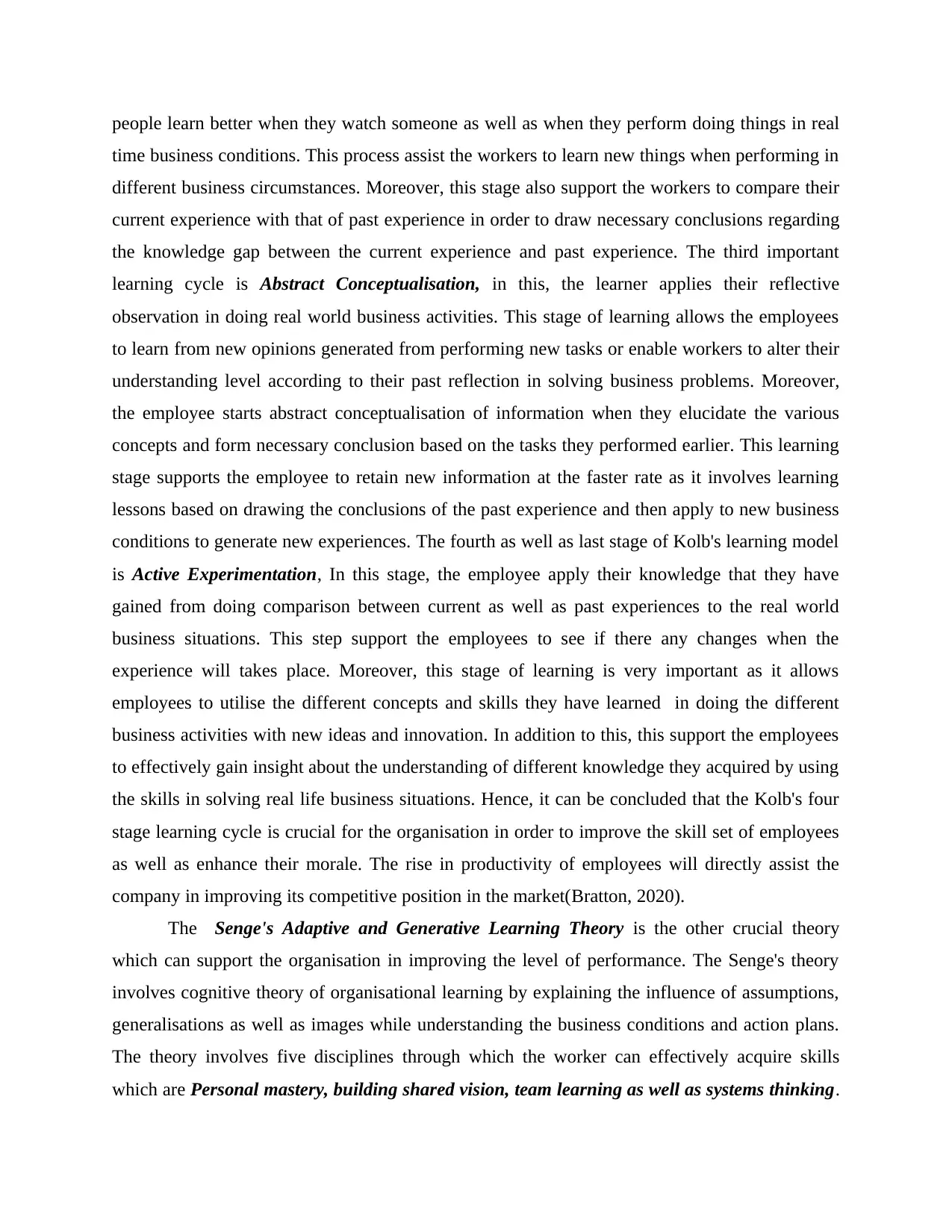
people learn better when they watch someone as well as when they perform doing things in real
time business conditions. This process assist the workers to learn new things when performing in
different business circumstances. Moreover, this stage also support the workers to compare their
current experience with that of past experience in order to draw necessary conclusions regarding
the knowledge gap between the current experience and past experience. The third important
learning cycle is Abstract Conceptualisation, in this, the learner applies their reflective
observation in doing real world business activities. This stage of learning allows the employees
to learn from new opinions generated from performing new tasks or enable workers to alter their
understanding level according to their past reflection in solving business problems. Moreover,
the employee starts abstract conceptualisation of information when they elucidate the various
concepts and form necessary conclusion based on the tasks they performed earlier. This learning
stage supports the employee to retain new information at the faster rate as it involves learning
lessons based on drawing the conclusions of the past experience and then apply to new business
conditions to generate new experiences. The fourth as well as last stage of Kolb's learning model
is Active Experimentation, In this stage, the employee apply their knowledge that they have
gained from doing comparison between current as well as past experiences to the real world
business situations. This step support the employees to see if there any changes when the
experience will takes place. Moreover, this stage of learning is very important as it allows
employees to utilise the different concepts and skills they have learned in doing the different
business activities with new ideas and innovation. In addition to this, this support the employees
to effectively gain insight about the understanding of different knowledge they acquired by using
the skills in solving real life business situations. Hence, it can be concluded that the Kolb's four
stage learning cycle is crucial for the organisation in order to improve the skill set of employees
as well as enhance their morale. The rise in productivity of employees will directly assist the
company in improving its competitive position in the market(Bratton, 2020).
The Senge's Adaptive and Generative Learning Theory is the other crucial theory
which can support the organisation in improving the level of performance. The Senge's theory
involves cognitive theory of organisational learning by explaining the influence of assumptions,
generalisations as well as images while understanding the business conditions and action plans.
The theory involves five disciplines through which the worker can effectively acquire skills
which are Personal mastery, building shared vision, team learning as well as systems thinking.
time business conditions. This process assist the workers to learn new things when performing in
different business circumstances. Moreover, this stage also support the workers to compare their
current experience with that of past experience in order to draw necessary conclusions regarding
the knowledge gap between the current experience and past experience. The third important
learning cycle is Abstract Conceptualisation, in this, the learner applies their reflective
observation in doing real world business activities. This stage of learning allows the employees
to learn from new opinions generated from performing new tasks or enable workers to alter their
understanding level according to their past reflection in solving business problems. Moreover,
the employee starts abstract conceptualisation of information when they elucidate the various
concepts and form necessary conclusion based on the tasks they performed earlier. This learning
stage supports the employee to retain new information at the faster rate as it involves learning
lessons based on drawing the conclusions of the past experience and then apply to new business
conditions to generate new experiences. The fourth as well as last stage of Kolb's learning model
is Active Experimentation, In this stage, the employee apply their knowledge that they have
gained from doing comparison between current as well as past experiences to the real world
business situations. This step support the employees to see if there any changes when the
experience will takes place. Moreover, this stage of learning is very important as it allows
employees to utilise the different concepts and skills they have learned in doing the different
business activities with new ideas and innovation. In addition to this, this support the employees
to effectively gain insight about the understanding of different knowledge they acquired by using
the skills in solving real life business situations. Hence, it can be concluded that the Kolb's four
stage learning cycle is crucial for the organisation in order to improve the skill set of employees
as well as enhance their morale. The rise in productivity of employees will directly assist the
company in improving its competitive position in the market(Bratton, 2020).
The Senge's Adaptive and Generative Learning Theory is the other crucial theory
which can support the organisation in improving the level of performance. The Senge's theory
involves cognitive theory of organisational learning by explaining the influence of assumptions,
generalisations as well as images while understanding the business conditions and action plans.
The theory involves five disciplines through which the worker can effectively acquire skills
which are Personal mastery, building shared vision, team learning as well as systems thinking.
Paraphrase This Document
Need a fresh take? Get an instant paraphrase of this document with our AI Paraphraser
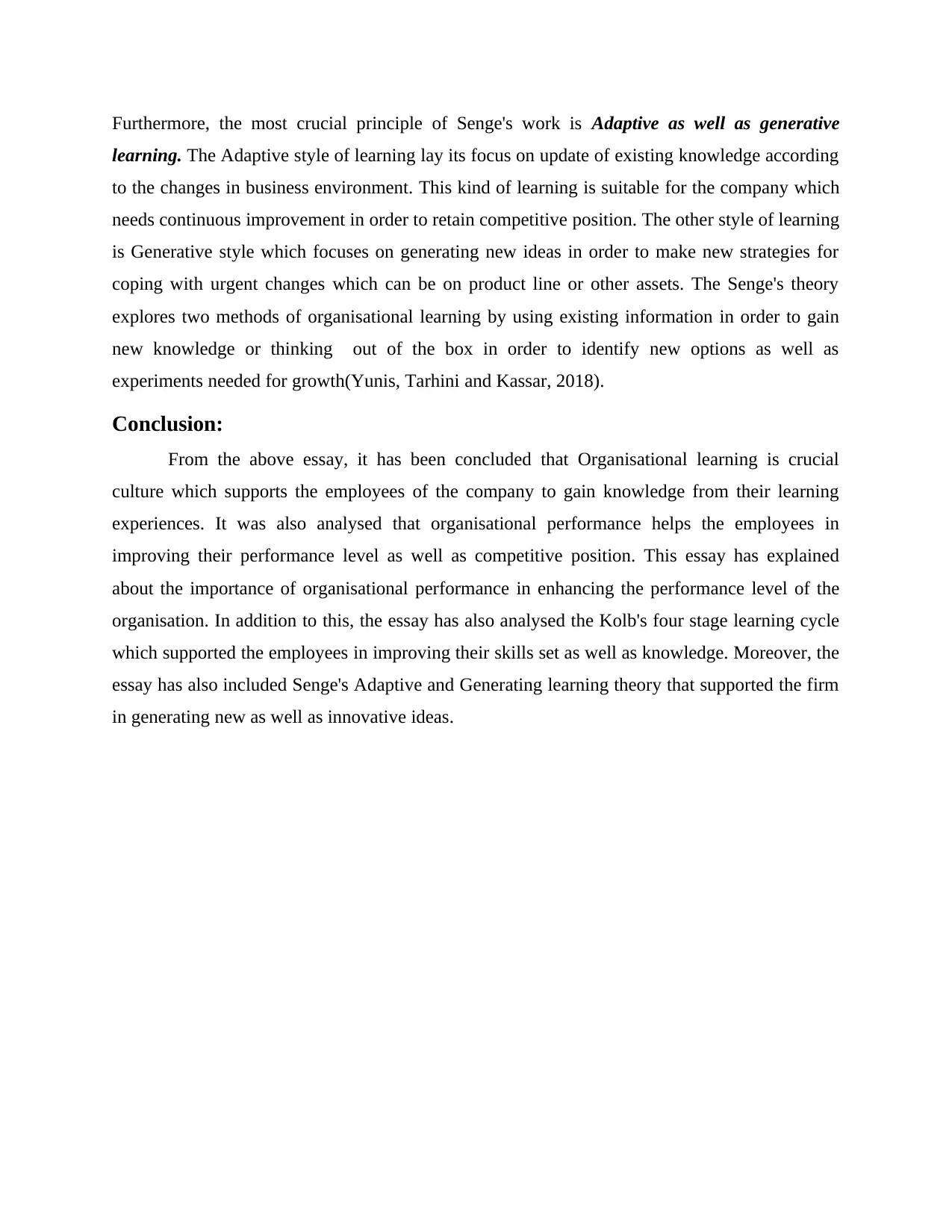
Furthermore, the most crucial principle of Senge's work is Adaptive as well as generative
learning. The Adaptive style of learning lay its focus on update of existing knowledge according
to the changes in business environment. This kind of learning is suitable for the company which
needs continuous improvement in order to retain competitive position. The other style of learning
is Generative style which focuses on generating new ideas in order to make new strategies for
coping with urgent changes which can be on product line or other assets. The Senge's theory
explores two methods of organisational learning by using existing information in order to gain
new knowledge or thinking out of the box in order to identify new options as well as
experiments needed for growth(Yunis, Tarhini and Kassar, 2018).
Conclusion:
From the above essay, it has been concluded that Organisational learning is crucial
culture which supports the employees of the company to gain knowledge from their learning
experiences. It was also analysed that organisational performance helps the employees in
improving their performance level as well as competitive position. This essay has explained
about the importance of organisational performance in enhancing the performance level of the
organisation. In addition to this, the essay has also analysed the Kolb's four stage learning cycle
which supported the employees in improving their skills set as well as knowledge. Moreover, the
essay has also included Senge's Adaptive and Generating learning theory that supported the firm
in generating new as well as innovative ideas.
learning. The Adaptive style of learning lay its focus on update of existing knowledge according
to the changes in business environment. This kind of learning is suitable for the company which
needs continuous improvement in order to retain competitive position. The other style of learning
is Generative style which focuses on generating new ideas in order to make new strategies for
coping with urgent changes which can be on product line or other assets. The Senge's theory
explores two methods of organisational learning by using existing information in order to gain
new knowledge or thinking out of the box in order to identify new options as well as
experiments needed for growth(Yunis, Tarhini and Kassar, 2018).
Conclusion:
From the above essay, it has been concluded that Organisational learning is crucial
culture which supports the employees of the company to gain knowledge from their learning
experiences. It was also analysed that organisational performance helps the employees in
improving their performance level as well as competitive position. This essay has explained
about the importance of organisational performance in enhancing the performance level of the
organisation. In addition to this, the essay has also analysed the Kolb's four stage learning cycle
which supported the employees in improving their skills set as well as knowledge. Moreover, the
essay has also included Senge's Adaptive and Generating learning theory that supported the firm
in generating new as well as innovative ideas.
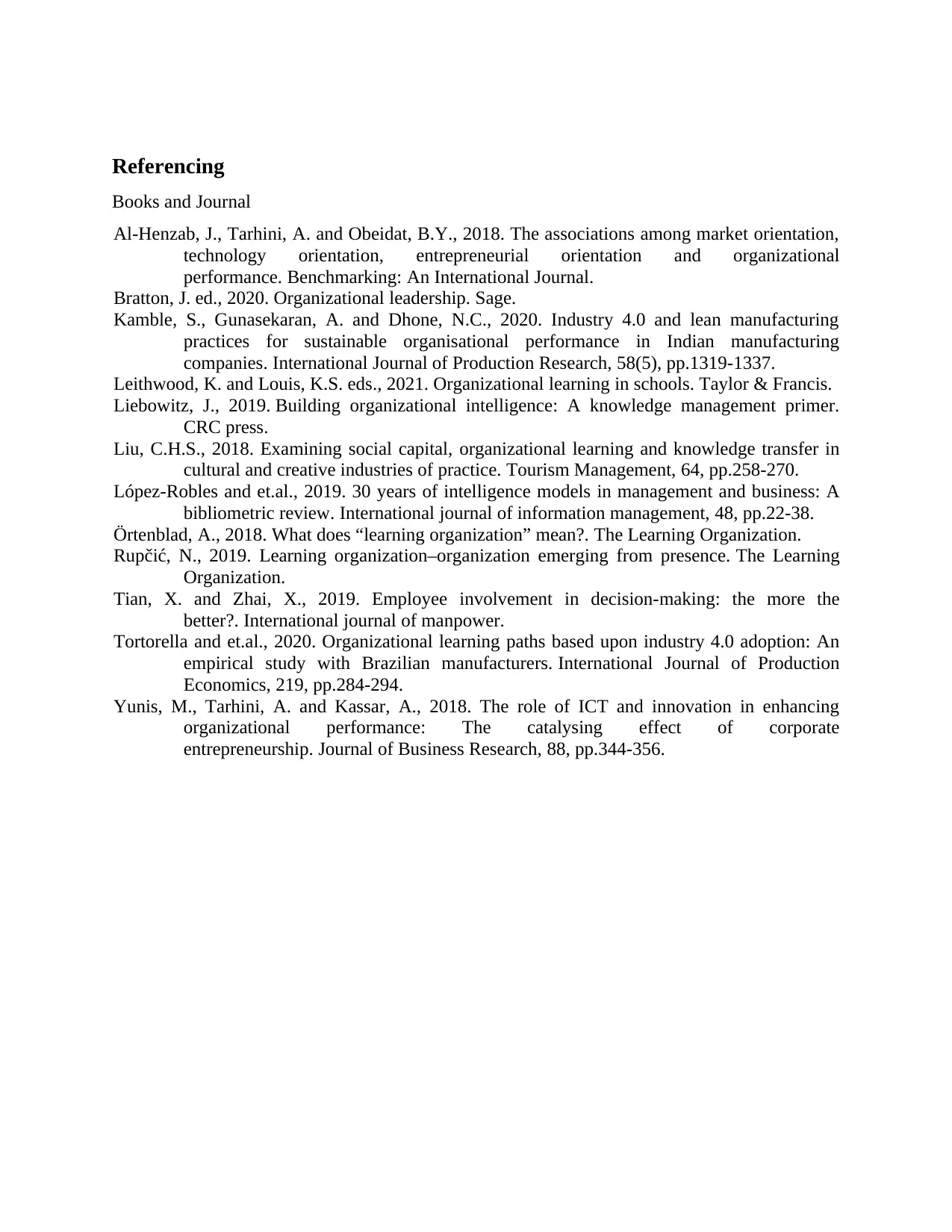
Referencing
Books and Journal
Al-Henzab, J., Tarhini, A. and Obeidat, B.Y., 2018. The associations among market orientation,
technology orientation, entrepreneurial orientation and organizational
performance. Benchmarking: An International Journal.
Bratton, J. ed., 2020. Organizational leadership. Sage.
Kamble, S., Gunasekaran, A. and Dhone, N.C., 2020. Industry 4.0 and lean manufacturing
practices for sustainable organisational performance in Indian manufacturing
companies. International Journal of Production Research, 58(5), pp.1319-1337.
Leithwood, K. and Louis, K.S. eds., 2021. Organizational learning in schools. Taylor & Francis.
Liebowitz, J., 2019. Building organizational intelligence: A knowledge management primer.
CRC press.
Liu, C.H.S., 2018. Examining social capital, organizational learning and knowledge transfer in
cultural and creative industries of practice. Tourism Management, 64, pp.258-270.
López-Robles and et.al., 2019. 30 years of intelligence models in management and business: A
bibliometric review. International journal of information management, 48, pp.22-38.
Örtenblad, A., 2018. What does “learning organization” mean?. The Learning Organization.
Rupčić, N., 2019. Learning organization–organization emerging from presence. The Learning
Organization.
Tian, X. and Zhai, X., 2019. Employee involvement in decision-making: the more the
better?. International journal of manpower.
Tortorella and et.al., 2020. Organizational learning paths based upon industry 4.0 adoption: An
empirical study with Brazilian manufacturers. International Journal of Production
Economics, 219, pp.284-294.
Yunis, M., Tarhini, A. and Kassar, A., 2018. The role of ICT and innovation in enhancing
organizational performance: The catalysing effect of corporate
entrepreneurship. Journal of Business Research, 88, pp.344-356.
Books and Journal
Al-Henzab, J., Tarhini, A. and Obeidat, B.Y., 2018. The associations among market orientation,
technology orientation, entrepreneurial orientation and organizational
performance. Benchmarking: An International Journal.
Bratton, J. ed., 2020. Organizational leadership. Sage.
Kamble, S., Gunasekaran, A. and Dhone, N.C., 2020. Industry 4.0 and lean manufacturing
practices for sustainable organisational performance in Indian manufacturing
companies. International Journal of Production Research, 58(5), pp.1319-1337.
Leithwood, K. and Louis, K.S. eds., 2021. Organizational learning in schools. Taylor & Francis.
Liebowitz, J., 2019. Building organizational intelligence: A knowledge management primer.
CRC press.
Liu, C.H.S., 2018. Examining social capital, organizational learning and knowledge transfer in
cultural and creative industries of practice. Tourism Management, 64, pp.258-270.
López-Robles and et.al., 2019. 30 years of intelligence models in management and business: A
bibliometric review. International journal of information management, 48, pp.22-38.
Örtenblad, A., 2018. What does “learning organization” mean?. The Learning Organization.
Rupčić, N., 2019. Learning organization–organization emerging from presence. The Learning
Organization.
Tian, X. and Zhai, X., 2019. Employee involvement in decision-making: the more the
better?. International journal of manpower.
Tortorella and et.al., 2020. Organizational learning paths based upon industry 4.0 adoption: An
empirical study with Brazilian manufacturers. International Journal of Production
Economics, 219, pp.284-294.
Yunis, M., Tarhini, A. and Kassar, A., 2018. The role of ICT and innovation in enhancing
organizational performance: The catalysing effect of corporate
entrepreneurship. Journal of Business Research, 88, pp.344-356.
⊘ This is a preview!⊘
Do you want full access?
Subscribe today to unlock all pages.

Trusted by 1+ million students worldwide

Paraphrase This Document
Need a fresh take? Get an instant paraphrase of this document with our AI Paraphraser

1 out of 11
Related Documents
Your All-in-One AI-Powered Toolkit for Academic Success.
+13062052269
info@desklib.com
Available 24*7 on WhatsApp / Email
![[object Object]](/_next/static/media/star-bottom.7253800d.svg)
Unlock your academic potential
Copyright © 2020–2026 A2Z Services. All Rights Reserved. Developed and managed by ZUCOL.





